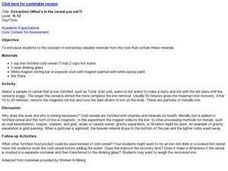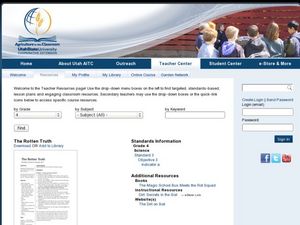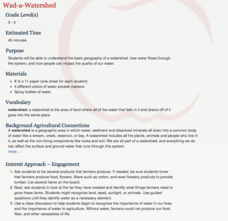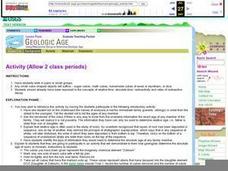Curated OER
Land Use Issues
Learners observe and describe the properties of rocks and their significance relationship in the environment. They explain the implications of destroying habitats and the importance of rebuilding them.
Curated OER
Mohs Hardness Test
Fifth graders examine what the Mohs Hardness Scale is before testing a number of minerals to determine their place on the scale. They test a fingernail, a penny, a knife blade, a metal file, and several unknown minerals and rocks using...
Curated OER
Mining and Land Reclamation - A Classroom Simulation
Students simulate mining mineral resources using cookies. In this earth science lesson, students analyze the cost and profits in mining. They write a lab report about the activity.
Curated OER
What Is Mining
Student develop a vocabulary of "mining words" and study about exploring and mining for minerals. They break into groups and are assigned an area at the "mine" to do their "exploration" for the valuable "coal". The coal is represented...
Curated OER
Extraction (What's in the cereal you eat?)
Students conduct an investigation with cereal that simulates the extraction of minerals from rock. They mix iron fortified cereal until the iron is extracted and shows on a magnetic stick that is painted white.
Curated OER
Smoothing Out the Rough Spots
Fifth graders experiment to observe the changes created on a surface by mechanical action of water with varying amounts of mineral content and abrasive qualities. They write the predictions of their outcomes and describe all of their...
Curated OER
COMPARE SOILS BY GROWING PLANTS
The student will identify the difference in the rate of plant growth in three soils that vary in organic matter.1. Obtain three to four flowerpots, different types of soil, a record chart, three to five beans for each pot, and water....
Curated OER
Build and Engineer an Underground Mine
Students answer questions on a worksheet about mineral processing, iron fillings, and how to safely manage the left over material after separated. This is really not a lesson plan, just a worksheet that is filled out following the making...
Curated OER
Project Geode
Pupils predict the appearance of a geode's internal structure based on its mass and density. They form a hypothesis based on the data they collect. They also identify common minerals found in Illinois.
Curated OER
Microscope Investigation
Students explore physical science by participating in a science examination. In this microscope tutorial lesson, students read the book The Naked Eye and discuss the purpose for using a microscope in the field of science. Students...
Curated OER
The Rotten Truth
Fourth graders investigate compost. In this Science instructional activity, 4th graders take notes on the components of soil and its relation to plant growth. Students describe the steps in making compost.
Curated OER
NASA's Mars Gamble Pays Off Part 2
Tenth graders explore the planet of Mars. In this Earth Science lesson, 10th graders read articles on the make up of Mars. Students complete a worksheet on their reading.
Curated OER
Transpiration
Students interactively explore the term transpiration. In this science/ecology activity, students discuss what they would do if they were thirsty while conducting research in Brazil. Additionally, students write descriptive words to...
Curated OER
"What If The Earth Were Made Of Sand
Students examine the most common characteristics of clay and sand, and to understand how the properties of these materials affect the erosion of the landscape and the formation of the many landforms. They explore clay and sand through...
Curated OER
"Investigating Soil Color and Texture"
Ninth graders will identify/understand the differences between soil and dirt. They will classify soil color accurately and use Munsell notation to describe it (Munsell books provided).Students will classify soil texture using the feel...
Curated OER
Fossil Fuels vs. Alternative Fueling Systems
Fourth graders brainstorm the differences between the fossil fuels that people use in their transportation now and what they could use to minimize greenhouse gas emissions. They use a variety of techniques from webquests to writing...
Curated OER
Metamorphic Rock: Melting Rocks
Students observe and gain a better understanding of the metamorphosing power of heat. They mix mini-marshmallows and chocolate chips in a bowl and add just enough peanut butter so the mixture clumps together.
Curated OER
Is There Water on Mars?
Young scholars decide whether or not there is or has even been water on Mars. They analyze temperature and pressure data from the Pathfinder mission to Mars, and then they analyze images of Mars, interpreting the landforms they see and...
Curated OER
Classroom Aquaponics: Exploring Nitrogen Cycling in a Closed System
Students investigate nutrient cycling in a simplified desktop ecosystem involving aquarium and hydro-ponically grown plants. They set up an aquarium with 10 gallons of water at least a week before the lab is planned and place...
Curated OER
From Curiosity Cabinet to Museum Collection
Learners study binomial nomenclature and museum-based research. They create a curiosity box, label the objects in their curiosity box , develop a classification scheme for the objects, and create a database of all objects collected by...
Curated OER
Our Natural Resources
Your class will learn about natural resources and man-made items and differentiate between them. They chart resources from seven pictures and explain how each natural resource is used.
Agriculture in the Classroom
Wad-a-Watershed
What kind of impact do humans have on watersheds? Find out in a instructional activity that defines, explores, and promotes ways to protect our watersheds. The ultimate goal of the instructional activity is for learners to discover how a...
Curated OER
Detectives in the Landscape
Fourth graders explore landscapes. In this landscape activity, 4th graders investigate different elements of landscapes. Students design a visual presentation using photographs taken during a nature walk.
Curated OER
Using Radioactive Decay to Determine Geologic Age
Students investigae using radioactive decay to determine geologic age.

























